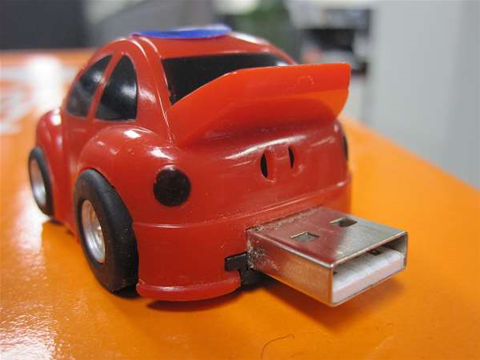Update: Troves of personal data files including resumes, tax returns, photos and documents have been found on USB keys lost on Sydney trains and sold to the public at a CityRail auction.
Paul Ducklin, chief technology officer at Sophos bought about 70 USBs at the September auction and uncovered personal data still stored on the devices.
"I'm sure if I was a thief that I could do really well," Ducklin said.
"We revealed a good deal of personal information about many of the people who lost the USBs, about their families, friends and colleagues."
The keys, sold without any attempt to wipe storage data, were auctioned en masse.
The NSW Privacy Office has chastised RailCorp for selling the devices.
"They should be following best practice. They should be cleaning these USBs of the information," deputy privacy commissioner John McAteer said.
The state-owned corporation was not bound by the same strict privacy guidelines to which other institutions must adhere.
But that was no excuse, McAteer said.
"By selling the information on the USBs they are deemed to be using it and they should delete the information."
"They should not disclose the data without the consent of the person the data relates to."
A simple script run by Ducklin on the keys revealed the personal data.
None of the devices were encrypted.
The "cursory analysis" did not examine deleted information still present on the recycle bin folders on the keys nor attempted to recover data that users had tried to erase.
RailCorp could not immediately respond when asked if it had considered that selling the devices without wiping stored data could be a breach of privacy.
To some, the auction could be seen as a bazaar for data theives.
The news comes on the heels of reports last month that revealed the Department of Defence launched an investigation when a USB owned by a senior Australian military official went missing in Kuwait.
Ducklin was shocked when the auction price was nearly twice the average retail value of the USBs.
Laptops believed wiped clean of data before being auctioned also met or exceeded retail value, Ducklin said.
But even deleted information could be easily recovered using tools readily available online.
Malware
A whopping 66 per cent of the 57 functional devices bought by Ducklin were infected with malware.
Malware targeting autorun files was the most common infection. All malware targeted Windows machines although seven USBs contained infections and were previously used on Mac computers.
All of the USBs contained a single FAT volume.
and documents have been found on USB keys lost on Sydney trains and
sold to the public at a CityRail auction.
Paul Ducklin, chief technology officer at Sophos bought 70 USBs at the
September auction and uncovered personal data still stored on the
devices.
"I'm sure if I was a thief that I could do really well," Ducklin said.
The keys, sold without any attempt to wipe storage data, were auctioned
by bucket loads.
A simple script run by Ducklin on the keys revealed none of the devices
were encrypted.
The "cursory analysis" did not examine deleted information still present on the recycle bin folders on the keys nor attempted to recover data that users had tried to erase.
RailCorp could not immediately respond when asked if it had considered
that selling the devices without wiping stored data could easily expose
sensitive data.
The auction could be seen as a veritable bazaar for data theives. In xxx Defence launched an investigation when a USB owned by a senior Australian military official went missing in Kuwait xxx.
Ducklin was shocked when the auction price was nearly twice the average
retail value of the USBs.
Laptops believed wiped clean of data before being auctioned also met or
exceeded retail value, Ducklin said.
But even deleted information could be easily recovered using tools readily available online.
"We revealed a good deal of personal information about many of the people who lost the USBs, about their families, friends and colleagues," Ducklin said.
The NSW Privacy office has been contacted for comment.
Malware
A whopping 66 per cent of the 57 functional devices bought by Ducklin were infected with malware.
Malware targeting autorun files was the most common infection. All malware targeted Windows machines although seven USBs contained infections and were previously used on Mac computers.
All of the USBs contained a single FAT volume.








_(21).jpg&h=142&w=230&c=1&s=1)
.jpg&h=142&w=230&c=1&s=1)




.jpg&w=100&c=1&s=0)







_(1).jpg&q=95&h=298&w=480&c=1&s=1)



